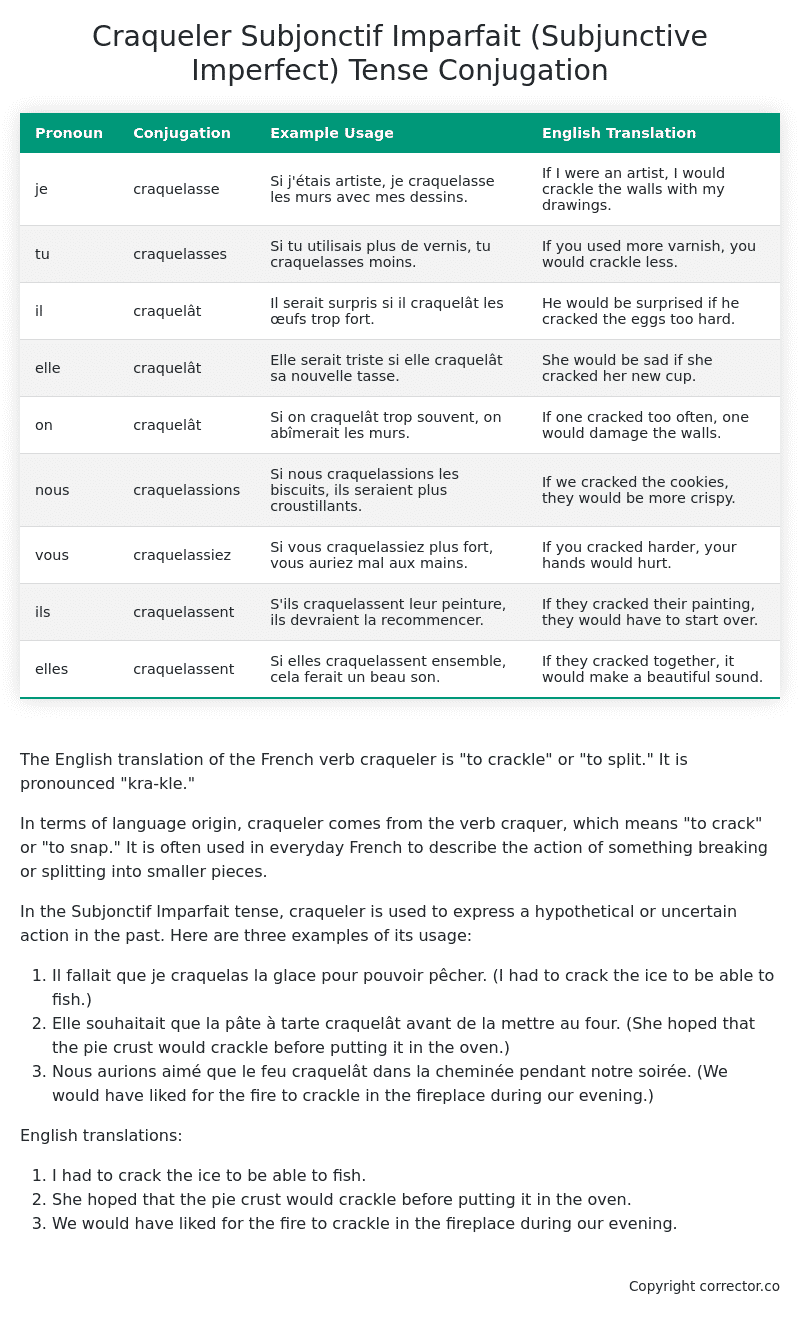Subjonctif Imparfait (Subjunctive Imperfect) Tense Conjugation of the French Verb craqueler
Introduction to the verb craqueler
The English translation of the French verb craqueler is “to crackle” or “to split.” It is pronounced “kra-kle.”
In terms of language origin, craqueler comes from the verb craquer, which means “to crack” or “to snap.” It is often used in everyday French to describe the action of something breaking or splitting into smaller pieces.
In the Subjonctif Imparfait tense, craqueler is used to express a hypothetical or uncertain action in the past. Here are three examples of its usage:
- Il fallait que je craquelas la glace pour pouvoir pêcher. (I had to crack the ice to be able to fish.)
- Elle souhaitait que la pâte à tarte craquelât avant de la mettre au four. (She hoped that the pie crust would crackle before putting it in the oven.)
- Nous aurions aimé que le feu craquelât dans la cheminée pendant notre soirée. (We would have liked for the fire to crackle in the fireplace during our evening.)
English translations:
- I had to crack the ice to be able to fish.
- She hoped that the pie crust would crackle before putting it in the oven.
- We would have liked for the fire to crackle in the fireplace during our evening.
Table of the Subjonctif Imparfait (Subjunctive Imperfect) Tense Conjugation of craqueler
| Pronoun | Conjugation | Example Usage | English Translation |
|---|---|---|---|
| je | craquelasse | Si j’étais artiste, je craquelasse les murs avec mes dessins. | If I were an artist, I would crackle the walls with my drawings. |
| tu | craquelasses | Si tu utilisais plus de vernis, tu craquelasses moins. | If you used more varnish, you would crackle less. |
| il | craquelât | Il serait surpris si il craquelât les œufs trop fort. | He would be surprised if he cracked the eggs too hard. |
| elle | craquelât | Elle serait triste si elle craquelât sa nouvelle tasse. | She would be sad if she cracked her new cup. |
| on | craquelât | Si on craquelât trop souvent, on abîmerait les murs. | If one cracked too often, one would damage the walls. |
| nous | craquelassions | Si nous craquelassions les biscuits, ils seraient plus croustillants. | If we cracked the cookies, they would be more crispy. |
| vous | craquelassiez | Si vous craquelassiez plus fort, vous auriez mal aux mains. | If you cracked harder, your hands would hurt. |
| ils | craquelassent | S’ils craquelassent leur peinture, ils devraient la recommencer. | If they cracked their painting, they would have to start over. |
| elles | craquelassent | Si elles craquelassent ensemble, cela ferait un beau son. | If they cracked together, it would make a beautiful sound. |
Other Conjugations for Craqueler.
Le Present (Present Tense) Conjugation of the French Verb craqueler
Imparfait (Imperfect) Tense Conjugation of the French Verb craqueler
Passé Simple (Simple Past) Tense Conjugation of the French Verb craqueler
Passé Composé (Present Perfect) Tense Conjugation of the French Verb craqueler
Futur Simple (Simple Future) Tense Conjugation of the French Verb craqueler
Futur Proche (Near Future) Tense Conjugation of the French Verb craqueler
Plus-que-parfait (Pluperfect) Tense Conjugation of the French Verb craqueler
Passé Antérieur (Past Anterior) Tense Conjugation of the French Verb craqueler
Futur Antérieur (Future Anterior) Tense Conjugation of the French Verb craqueler
Subjonctif Présent (Subjunctive Present) Tense Conjugation of the French Verb craqueler
Subjonctif Passé (Subjunctive Past) Tense Conjugation of the French Verb craqueler
Subjonctif Imparfait (Subjunctive Imperfect) Tense Conjugation of the French Verb craqueler (this article)
Subjonctif Plus-que-parfait (Subjunctive Pluperfect) Tense Conjugation of the French Verb craqueler
Conditionnel Présent (Conditional Present) Tense Conjugation of the French Verb craqueler
Conditionnel Passé (Conditional Past) Tense Conjugation of the French Verb craqueler
L’impératif Présent (Imperative Present) Tense Conjugation of the French Verb craqueler
L’infinitif Présent (Infinitive Present) Tense Conjugation of the French Verb craqueler
Struggling with French verbs or the language in general? Why not use our free French Grammar Checker – no registration required!
Get a FREE Download Study Sheet of this Conjugation 🔥
Simply right click the image below, click “save image” and get your free reference for the craqueler Subjonctif Imparfait tense conjugation!

Craqueler – About the French Subjonctif Imparfait (Subjunctive Imperfect) Tense
Formation
Common Everyday Usage Patterns
Interactions with Other Tenses
Subjonctif Présent
Indicatif Passé Composé
Conditional
Conditional Perfect
Summary
I hope you enjoyed this article on the verb craqueler. Still in a learning mood? Check out another TOTALLY random French verb conjugation!


